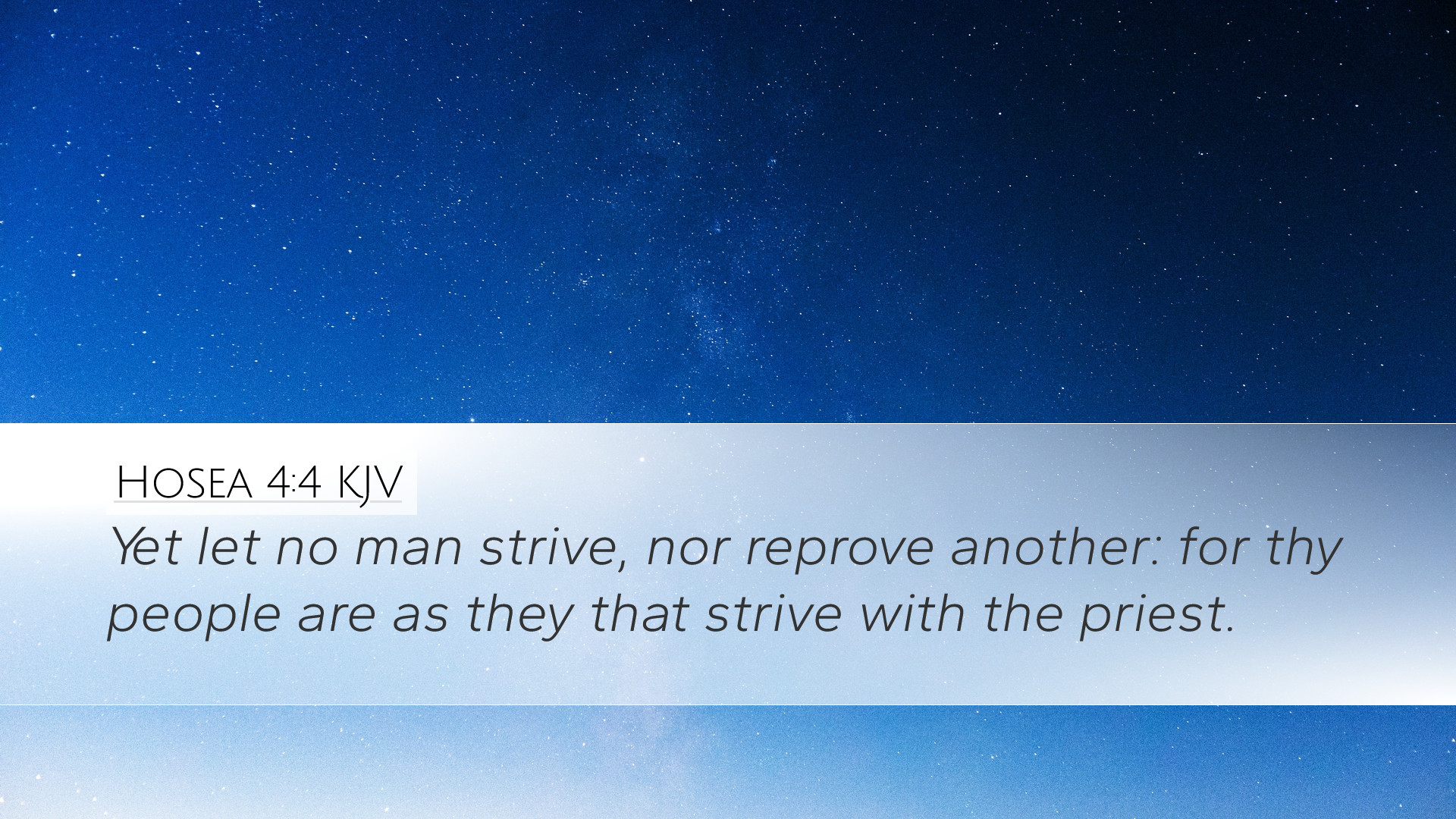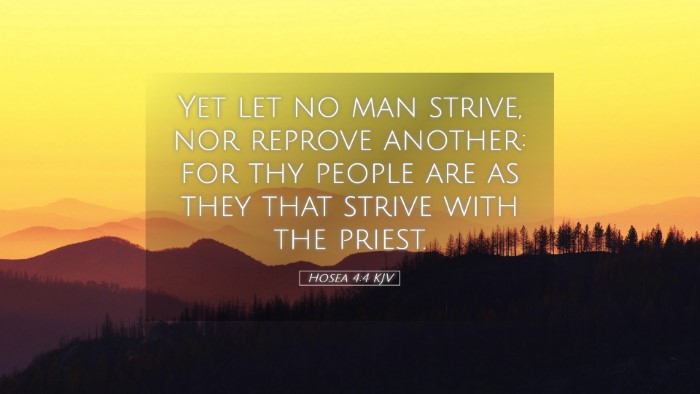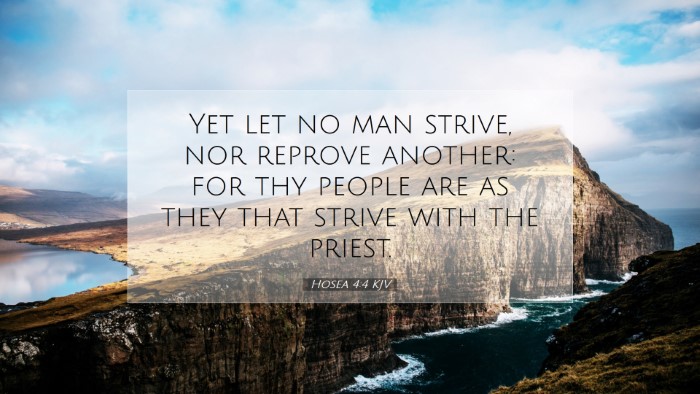Old Testament
Genesis Exodus Leviticus Numbers Deuteronomy Joshua Judges Ruth 1 Samuel 2 Samuel 1 Kings 2 Kings 1 Chronicles 2 Chronicles Ezra Nehemiah Esther Job Psalms Proverbs Ecclesiastes Song of Solomon Isaiah Jeremiah Lamentations Ezekiel Daniel Hosea Joel Amos Obadiah Jonah Micah Nahum Habakkuk Zephaniah Haggai Zechariah MalachiHosea 4:4
Hosea 4:4 KJV
Yet let no man strive, nor reprove another: for thy people are as they that strive with the priest.
Hosea 4:4 Bible Commentary
Commentary on Hosea 4:4
Verse: "Yet let no man strive, nor reprove another: for thy people are as they that strive with the priest."
Contextual Overview
The Book of Hosea, written during a period of moral decay and spiritual apostasy in Israel, serves as both a warning and a call to repentance. The verse in focus highlights significant relational breakdowns not only among the people but also between them and their spiritual leaders.
Analysis of Hosea 4:4
This verse can be understood through the lens of three primary themes:
- The Relational Tension: Hosea calls attention to the conflict and strife among the people of Israel. This is not just a social struggle but a deep-seated issue involving their relationship with God and His ordained leaders.
- Disregard for Spiritual Authority: The mention of "striving with the priest" underlines the lack of respect shown towards the established religious authority. The priest serves as a mediator between God and the people, yet the people's reluctance to heed his guidance shows their spiritual decline.
- The Call for Unity and Respect: Hosea’s admonition for not striving or reproving each other reflects a divine desire for unity, encouraging the people to maintain a respectful dialogue and practice compassion rather than conflict.
Insights from Public Domain Commentaries
Matthew Henry's Commentary
Matthew Henry emphasizes the gravity of strife in spiritual matters. He points out that when people begin to contend against their leaders and disregard their guidance, they pave the way for further spiritual decline. He argues:
"Striving with one another, particularly in spiritual matters, is a sign of an ill-disposition of heart. It is the way to damage one's own soul and the souls of others."
Albert Barnes' Notes on the Bible
Barnes illustrates that this verse encapsulates the folly and danger of internal strife, especially with regard to spiritual governance. He explains that:
"Hosea teaches us that contention among brethren, especially in matters regarding faith, leads to confusion and impedes the work of the Spirit among the people."
Barnes further notes the significance of recognizing leaders' roles, emphasizing the need for reverence in spiritual discourse:
"By resisting the priest, they resist the divine authority which he represents. This is a perilous state of affairs for any community of faith."
Adam Clarke's Commentary
Clarke points out that this strife is symptomatic of a deeper issue: the people's estrangement from God. His analysis focuses on the consequences of such a breakdown:
"When the people cease to honor divine appointments, they fall into a pit of moral chaos and disillusionment. The priest here epitomizes God’s call to righteousness, which, if unheeded, leads the community into darkness."
Clarke also presents the practical implications of Hosea's warning, urging the importance of recognizing authority and fostering harmony:
"Unity and peace are to be sought after earnestly; for they are essential for the presence of God among His people."
Theological Implications
The implications of Hosea 4:4 resonate deeply within the Christian church today. The warning against striving can be seen as a call to cultivate unity within congregations. The lack of respect for spiritual leaders often mirrors broader issues related to the authority of Scripture and the role of the church in society.
1. Authority in the Church
This verse serves as a reminder that respecting spiritual authority is foundational for ecclesiastical health. The role of the priest—here representative of the pastoral ministry—must be held in high regard to facilitate a conducive environment for growth and communal worship.
2. The Perils of Division
Internal strife can lead to disunity within the body of Christ, undermining its mission and witness. Herein lies the urgency of Hosea’s message: the call to lay aside conflict for the sake of spiritual vitality and community harmony.
3. Reflection on Strife
Pastors and church leaders are reminded to reflect on the nature of their leadership—encouraging dialogue rather than conflict, building bridges instead of walls. The call is for restorative, rather than punitive, approaches to resolve disagreements.
Conclusion
Hosea 4:4 serves as a timeless reminder of the challenges that arise in communities of faith. As the Body of Christ, believers are called to a higher standard of unity, respect, and love towards one another and their leaders. Engaging with this passage invites pastors, students, and scholars alike to reflect on their own practices and the communal life of the church in light of God's enduring call to reconciliation.


